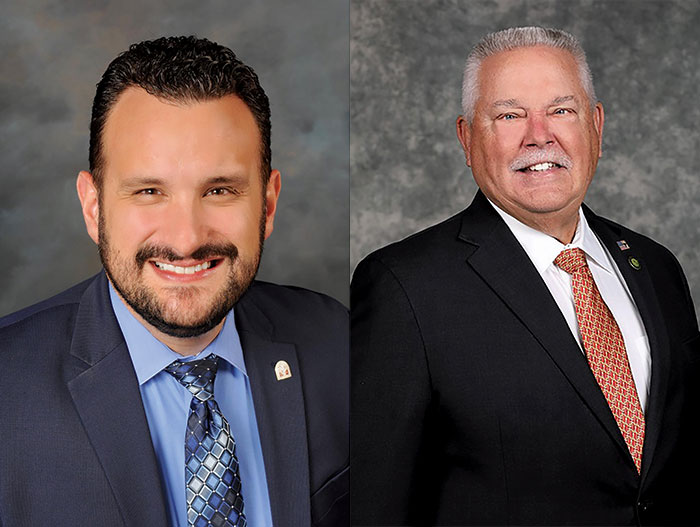Council approves one-year contract with employee groups
The Claremont City Council passed a group of agreements outlining employee benefits Tuesday night.
The roughly 135-page memoranda of understanding (MOU), passed as a consent calendar item—which means it was part of a group of items deemed non-controversial by city staff and passed with a single vote—caps off months of negotiation during closed session with members of the city council and several city employee associations.
Aspects covered in the MOU include pension programs, tuition reimbursements, salaries, life insurance and disability.
Those groups include the Claremont Management Association, the Claremont Employees’ Association, the Claremont Administrative and Technical Support Employee Association, Claremont Professional Employees Association and the Claremont Police Officers Association.
Claremont Finance Director Adam Pirrie, who characterized the memoranda as contracts between the city and its employees, noted employee associations are common in the city—the only two city employees with individual contracts are City Manager Tony Ramos, who is hired by the city council, and Assistant City Manager Colin Tudor, who acted as the chief negotiator with the employee groups.
The memoranda usually run for three years, with the previous iteration expiring on June 30. This time, however, the MOU is only set to last one year until negotiations start up again.
The reason for this, Mr. Pirrie noted, was uncertainty over future costs.
“We wanted a shorter agreement so we have a better sense of what things look like financially,” he said.
These costs include legal fees incurred in the city’s attempted takeover of the water system, which the city is appealing. But perhaps the most critical factor—which could affect cities across the state—is the projected uptick in CalPERS retirement costs. Mr. Pirrie noted the city is looking for “a better handle on those first cost increases” so the city knows those costs when they go back to the employee groups to hammer out a plan.
City contributions to CalPERS are set to increase due to a lower-than-expected rate of return (from 7.5 percent to 7 percent, according to the website Pensions & Investments) and a change in investment return assumption, which results in annual increases in CalPERS employer contributions, the city said. Those increases are set to reach $975,672 in 2021-2022, which is a marked increase from the current level of $168,696 for 2017-2018, according to the staff report.
Under CalPERS, the city classifies its employees under two groups: “classic members” and “new members.” Classic members are employees who were hired by the city before January 2013, when the Public Employees Pension Reform Act (PEPRA) was passed, and new members are employees who were hired after.
PEPRA, in part, limits compensation for CalPERS members, and affects newer members the most.
Classic members will pay about 8 percent of their pay toward the employee share, while new members would contribute 6.25 percent, or 50 percent of the total “normal cost” (i.e. whatever the cost is to pay for future benefits, according to the Service Employees International Union) determined by CalPERS, whichever is greater.
Safety employees will contribute 11.50 percent, or 50 percent of the total normal cost, according to the memoranda.
A few employees will get raises as a result of a salary survey in January. The city’s public information officer, Bevin Handel, will receive a four percent increase; the community services manager will receive a 3 percent increase and the human services manager a 2.5 percent increase. On the safety side, police corporals will receive a one percent increase, and police officers and jailers will receive a 0.5 percent increase.
Included in the MOU is a “flexible benefit plan,” to which the city would contribute $1,014 per month for health insurance. Employees are not required to use the full amount, and if an employee doesn’t use the full amount—in part due to an existing health insurance plan they may have—the remainder would be given to the employee as taxable income, according to the MOU.
For employees with the Claremont Police Management Association, the flexible benefit plan amounts to $1,151 monthly. For the Claremont Police Officers Association, the plan amounts to $1,294 per month, according to the MOU.
Additionally, the city would allow employees to “cash out” either up to 48 hours of accumulated leave, or 2.4 percent of their base salary, as a lump sum bonus on two dates, July 20 and November 23.
For Claremont police employees, the city is allowing tuition reimbursement of up to $1,500 per year for costs including textbooks, health fees, transportation and parking fees and application fees, according to the MOU with the Claremont Police Management Association. If an employee is directed by the police chief to take a certain class, the city can pay the full cost of tuition and fees in advance.
For police officers, tuition is reimbursed only if the student receives a C grade or higher in undergraduate courses, or a B grade or higher in graduate courses, according to the MOU.
The memoranda go into effect on July 1.
—Matthew Bramlett
news@claremont-courier.com








0 Comments